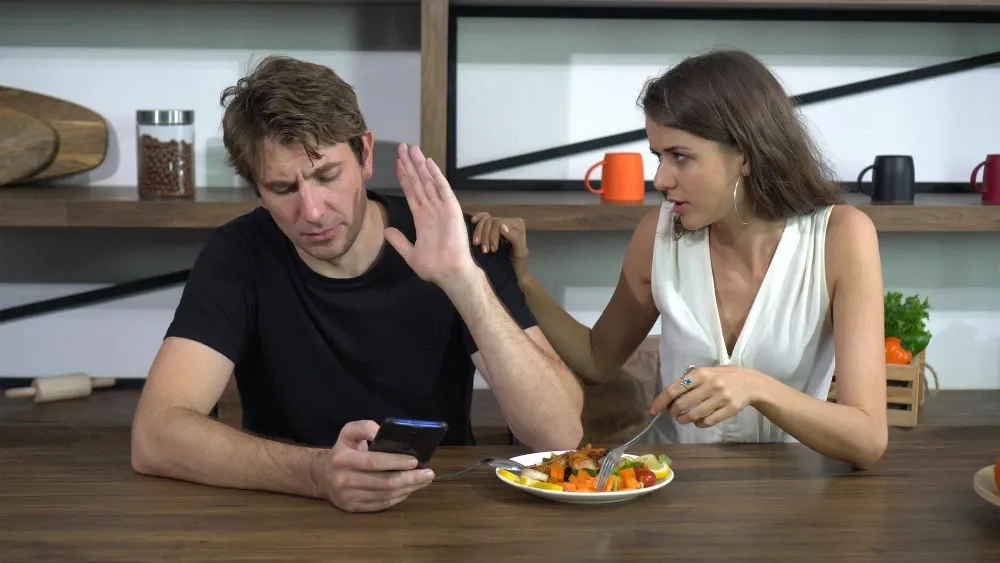How Does Excessive Screen Time From Cell Phones Ruin Romantic Relationships?
"We’re more connected than ever, yet sometimes feel so far apart."
Have you ever paused mid-scroll to glance up at your partner, only to realize they’re also glued to their phone? It’s a quiet irony of our times: the tools meant to bring us closer often end up pushing us apart. Your screen could be sabotaging your love life without you even realizing it.
In this article, we’ll uncover the surprising ways screen time impacts your relationship, why it’s not all bad, and how to reclaim connection in a tech-driven world, especially considering how cell phones ruining relationships can quietly take a toll.
Cell Phone Devices: Silent Intruder in Your Relationship
Think back to your last heartfelt conversation with your partner. Was your phone sitting on the table, glowing softly with notifications? If it was, you’re not alone.
Research published in the
World Economic Forum revealed that couples who often keep their phones within reach during conversations often experience fewer connections and less empathy towards each other, highlighting the impact of phones and relationships.
Even when the phone isn’t actively used, its mere presence can undermine intimacy, reducing feelings of closeness and trust between partners. Surprising, right? Why does this happen? Because love thrives on attention. When your partner feels you’re dividing your focus between them and your screen, it sends a message: "The device is more important than you."

The Good, the Bad, and the Ugly of Screen Time
1. The Good:
Technology has its perks in relationships. Long-distance couples swear by video calls, shared playlists, and digital date nights. Apps like “Paired” or “Lasting” offer tools to improve communication and understanding. For many, technology is a lifeline.
But let’s not sugarcoat it. When screens take over, trouble brews.
2. The Bad:
Quality time with those quiet, meaningful moments is eroding. A survey by the
University of Arizona found that couples who frequently use phones during shared moments report lower relationship satisfaction. Scrolling through TikTok or checking emails during dinner may seem harmless, but these micro-distractions erode the emotional connection, highlighting the negative effects of cell phones on relationships.
3. The Ugly:
Now, let’s address the elephant in the room: social media jealousy. A Pew Research study revealed that 60% of people feel jealous because of their partner’s social media interactions.
A casual comment, a heart emoji, or even excessive likes can stir up insecurity. While it might seem trivial, the emotional fallout can be anything but. These statistics on communication in relationships show just how deeply digital interactions can impact trust and emotional well-being.
Relatable Moments That Hit Close to Home
Let’s be real: We’ve all been there.
- Your partner says something, but you’re too busy texting to catch it.
- You’re supposed to watch a movie together, but they’re checking emails.
- A romantic dinner is interrupted by yet another “urgent” notification.
Each of these moments chips away at intimacy. They might seem small, but over time, they add up. The result? Partners feel unseen, unheard, and undervalued. This isn’t what anyone signs up for in a relationship.
The Science Speaks: Screen Time’s Impact on Love
Imagine sharing something deeply personal with your partner, only to notice them engrossed in their phone. It’s not just disappointing—it can feel downright hurtful. This behaviour has a name: "phubbing" (phone snubbing). Phubbing refers to the act of ignoring one’s companion in favour of focusing on a phone. It’s a clear example of how texting ruins relationships, as it takes away from meaningful, face-to-face interactions.
No matter if it is scrolling through social media, replying to emails, or checking notifications, this seemingly harmless habit creates a subtle yet powerful message: the person in front of you isn’t as important as what’s on your screen. Over time, phubbing erodes emotional connections, leaving the ignored partner feeling undervalued and disconnected.
- A study by Faruk Caner, a Professor at Justice Vocational School, Turkey, revealed that phubbing significantly reduces relationship satisfaction and fosters jealousy.
- Similarly, Dr. Brandon, an Assistant Professor of Human Development and Family Science at Illinois State University, found that 70% of couples report technology interfering with their relationship, leading to feelings of rejection, resentment, and even depressive symptoms.
These seemingly small habits aren’t as harmless as they appear. By setting boundaries and prioritizing presence, couples can reclaim trust and rekindle connection.
So, Is There Hope? Absolutely.
You don’t have to choose between your relationship and your screen. You just need to redefine how you use technology. The key is balance, intentionality, and a little bit of effort.
How to Improve Your Relationship: 4 Ways to Reduce Screen Time and Build Real Connections
-
Address the Social Media Jealousy
Social media often brings unnecessary tensions into relationships, whether it’s over a comment on TikTok or Instagram-like. Instead of letting these small moments grow into bigger issues, create “partner-first” time to nurture your connection.
-
Dedicate specific times, like an hour each evening or Sunday morning, to be fully present with your partner. Use this time to talk openly about any insecurities or feelings triggered by online interactions.
-
If you choose to use devices together, make it meaningful. For example, explore shared hobbies through tutorials, watch a short stand-up comedy special, or read an interesting article that sparks conversation.
-
Agree on boundaries for online behaviour, such as what feels comfortable to share or like publicly. This builds trust and reduces misunderstandings.
By consciously prioritizing your partner over your devices, you’ll strengthen your relationship and eliminate unnecessary social media-driven doubts.
2. Making Technology Work for Your Relationship
Screen time doesn’t have to be a wedge in your relationship. When used intentionally, it can bring you closer.
- Watch a series or movie you both enjoy and discuss your favourite moments afterwards.
- Dive into a multiplayer or cooperative game that encourages teamwork and laughter. For example, try light-hearted games like “Overcooked” or “Mario Kart.”
- Share your sense of humour through memes, funny videos, or nostalgic music playlists.
- Relive memories by scrolling through your gallery or revisiting old messages to reignite happy moments.
When screen time is purposeful and shared, it creates bonding opportunities instead of pulling you apart.
3. Pause Technology, Start Conversations
In a world where notifications never stop, carving out tech-free moments is essential for meaningful connection. These moments aren’t about banning devices but about being intentional. It’s not about locked phones in a relationship but about fostering trust and creating space for genuine, uninterrupted interaction.
-
Start your day with a tech-free breakfast, discussing your plans or sharing thoughts.
-
Make meals for the two of you. Ask reflective questions like, “What made you laugh today?” or “What’s something you’re looking forward to this week?”
-
At night, create a calming pre-bed routine by reflecting on what you’re grateful for or simply talking about your dreams and goals.
-
If a full tech-free hour feels overwhelming, try shorter pockets like 15 minutes to begin with.
These small, intentional habits prioritize your partner over screens, leading to more meaningful and enriching conversations.
4. Choose Presence Over Pixels
Being present isn’t just about turning off your phone. It’s about showing your partner that they are your priority.
- During conversations, make eye contact, actively listen, and ask follow-up questions to show genuine interest. For example, if your partner shares a work story, ask, “What did you learn from that?” or “How did it make you feel?”
- Avoid multitasking during important moments. If you’re tempted to check your phone, remind yourself of the value of being fully engaged in the conversation.
- Use physical gestures like holding hands, offering a reassuring smile, or sitting closer during a discussion. These small acts often communicate love and attention more effectively than words.
The habit of being fully present strengthens emotional trust and reminds your partner of their importance in your life.
Professional Perspectives on Relationships
Dr. Jean Twenge, a Professor of Psychology at San Diego State University and author of iGen, emphasizes: "The issue isn’t technology itself, but how we let it take over moments meant for connection. Setting limits is essential to maintaining intimacy."
Supporting this perspective, research published in the
Journal of Social and Personal Relationships found that the mere presence of mobile devices during interpersonal interactions can diminish the quality of conversations, leading to decreased closeness and connection.
These insights highlight the importance of establishing boundaries around technology use to preserve and enhance relationship satisfaction, especially as we tend to expect too much from our romantic partners, sometimes relying on them to fulfill emotional needs that technology can’t replace.
It’s Time to Reclaim Your Connection
So, where do you stand? Is your screen time helping or hurting your relationship? The choice isn’t about technology versus love it’s about using technology to enhance love. Your phone doesn’t have to be a villain; it can be an ally.
However, if not managed properly, phones kill relationships by taking away the quality time that truly strengthens connections.
The next time you’re tempted to scroll, pause and ask yourself: “Is this strengthening my connection or weakening it?” A simple shift in awareness can change everything.
JOLT helps you create healthier habits by blocking distractions during the moments that matter most like sharing a meal or winding down together before bed.
It encourages small but powerful changes, such as setting app limits or carving out intentional screen-free time throughout the day. These steps help you focus on each other, ensuring that technology enhances your bond rather than disrupts your connection.
With
The Jolt App, even on your busiest days, you’ll find those precious moments to truly connect, laugh, and share conversation without distractions. It’s about prioritizing each other, so every moment spent together brings you closer in ways that make a real difference.
Closing Thought: Love Deserves Attention
At its core, love is about presence, trust, and connection. Screens? They’re just tools. Whether they build or break your bond depends on how you use them. So the next time a notification pings, remember: Your relationship deserves more than a glance. It deserves your full attention.
Put down the phone. Look up. And let love take centre stage.





 Dr. Manish Singh
Dr. Manish Singh